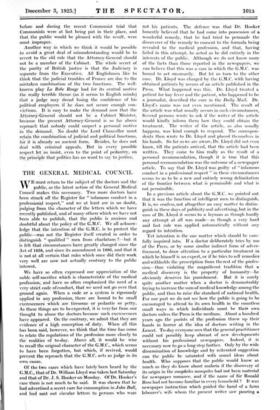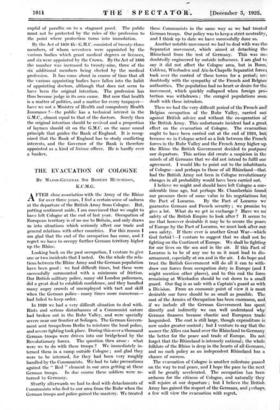THE GENERAL MEDICAL COUNCIL TOTE must return to the subject
of the doctors and the public, as the latest action of the General Medical Council makes this necessary. Two more doctors have been struck off the Register for " infamous conduct in a professional respect," and we at least are in no doubt, judging from the character of the letters which we have recently published, and of many others which we have not been able to publish, that the public is anxious and doubtful about the policy of the G.M.C. We all acknow- ledge that the intention of the G.M.C. is to protect the public—was not the Register itself created in order to distinguish " qualified " men from charlatans ?—but it is felt that circumstances have greatly changed since the Act of 1858, and since its amendment in 1886, and that it is not at all certain that rules which once did their work very well are now not actually contrary to the public interest.
We have so often expressed our appreciation of the noble self-sacrifice which is characteristic of the medical profession; and have so often emphasized the need of a very strict code of conduct, that we need not go over that ground again. When a code or a system is rigorously applied in any profession, there arc bound to be small excrescences which are tiresome or pedantic or petty. As these things are to be expected, it is very far from our thought to abuse the doctors because such excrescences have appeared. On the contrary, we admit that they are evidence of a high conception of duty. When all this has been said, however, we think that the time has come to relate the regulations of the profession more closely to the realities of to-day. Above all, it would be wise to recall the original character of the G.M.C., which seems to have been forgotten, but which, if revived, would prevent the reproach that the G.M.C. acts as judge in its own cause.
Of the two cases which have lately been heard by the G.M.C., that of Dr. William Lloyd was taken last Saturday and that of Dr. J. S. Hooker on Monday. Of Dr. Hooker's case there is not much to be said. It was shown that he had advertised a secret cure for consumption in John Bull, and had sent out circular letters to persons who were not his patients. The defence was that Dr. Hooker honestly believed that he had come into possession of a wonderful remedy, that he had tried to persuade the discoverer of the remedy to consent to the formula being revealed to the medical profession, and that, having failed in this attempt, lie acted as he did entirely in the interests of the public. Although we do not know more of the facts than those reported in the newspapers, we can believe that this was a case in which the G.M.C. was bound to act summarily. But let us turn to the other case. Dr. Lloyd was charged by the G.M.C. with having obtained patients by means of an article published in the Press. . What happened was this. Dr. Lloyd treated a patient for hay fever and the patient, who happened to be a journalist, described the cure in the Daily Mail. Dr. Lloyd's name was not even mentioned. The result of the article was what usually occurs in such circumstances. Several persons wrote to ask if the writer of the article would kindly inform them how they could obtain the treatment.. . The writer of the article, as also usually happens, was kind enough to respond. The correspon- dents then wrote to Dr. Lloyd and placed them selves in his hands. So far as we arc aware, Dr. Lloyd did not even know, till the patients arrived, that the 'article had been written. They came to him really as the result of personal recommendation, though it is true that thiS personal recommendation was the outcome of a newspaper article. To say that Dr. Lloyd was guilty of "infamous conduct in a professional respect " in these circumstances seems to us to be a new and entirely wrong delimitation of the frontier between what is permissible and what is not permissible.
In a previous article about the G.M.C. we pointed out that it was the function of intelligent men to distinguish. It is, we confess, not altogether an easy matter to distin- guish in these days of publicity and advertising, but in the case of Dr. Lloyd it seems to a layman as though hardly any attempt at all was made—as though a very hard and fast rule was applied automatically without any regard to intention.
Yet intention is the one matter which should be care- fully inquired into. If a doctor deliberately tries by use of the Press, or by some similar indirect form of adver- tisement, to draw attention to a particular treatment in which he himself is an expert, or if he tries to sell remedies and withholds the prescription from the rest of the profes- sion—thus violating the magnificent tradition that a medical discovery is the property of humanity—he obviously deserves his punishment. But it is surely quite another matter when a doctor is demonstrably trying to increase the sum of medical knowledge among the public, and thus to raise the standard of national health. For our part we do not see how the public is going to be encouraged to attend to its own health in the countless small ways in which individuals must be their own doctors unless the Press is the medium. About a hundred years ago the purists of the profession threw up their hands in horror at the idea of doctors writing in the Lancet. To-day everyone sees that the general practitioner could not possibly keep abreast of new developments without his professional newspapers. Indeed, it is necessary now to go a long step further. Only by the wide dissemination of knowledge and by reiterated suggestion can the public be saturated with sound ideas about health. Who supposes that the public would know as much as they do know about malaria if the discovery of its origin in the anopheles mosquito had not been material for newspaper romance, and if the name of Sir Ronald Ross had not become familiar in every household ? It was newspaper instruction which guided the hand of a farm labourer's wife whom the present writer saw pouring a cupful of paraffin on to -a stagnant pond. The public must not be protected by the rules of the profession to the point" where protection! turns into immolation.
By the Act of 1858 tin G.M.C.-consisted of twenty-three members, of whom seventeen were appointed by the various bodies which grant medical degrees or licences, and six were appointed by the Crown. By the Act of 1886 the number was increased to twenty-nine, three of the six additional members being elected by the , medical profession. It has come about in course of time that all the various appointing bOdies haVe- fallen into the habit of appointing doctors, 'although. that does not .seem to have been the original intention. The profession has thus-become judge in its own cause. But now that health is a matter of politics, and a matter for every taipayer–: have we not a Ministry of Health and compulsory Health Insurance ?—the public • has a technical interest in the G.M.C., almost equal to that of the doctors. Surely then .
the original intention should be revived and a proportion of laymen should sit on the G.M.C. on the same sound principle that guides the Bank of England. It is recog- nized that the Bank of England has to study conflicting interests, and the Governor of the Bank is therefore appointed as a kind of liaison officer. He is hardly ever a banker.



































































 Previous page
Previous page